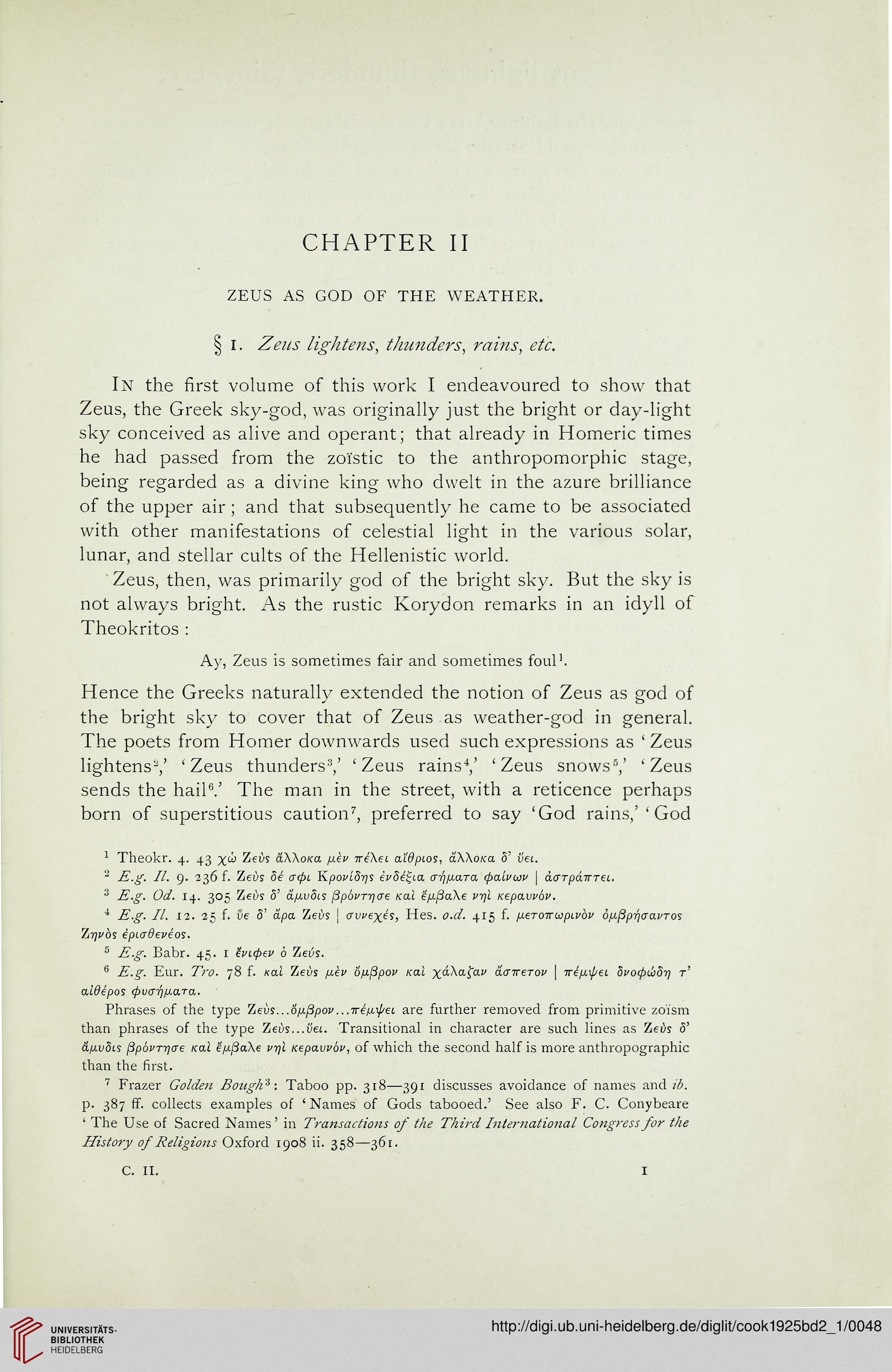CHAPTER II
ZEUS AS GOD OF THE WEATHER.
§ I. Zens lightens, thunders, rains, etc.
In the first volume of this work I endeavoured to show that
Zeus, the Greek sky-god, was originally just the bright or day-light
sky conceived as alive and operant; that already in Homeric times
he had passed from the zoi'stic to the anthropomorphic stage,
being regarded as a divine king who dwelt in the azure brilliance
of the upper air ; and that subsequently he came to be associated
with other manifestations of celestial light in the various solar,
lunar, and stellar cults of the Hellenistic world.
Zeus, then, was primarily god of the bright sky. But the sky is
not always bright. As the rustic Korydon remarks in an idyll of
Theokritos :
Ay, Zeus is sometimes fair and sometimes foul1.
Hence the Greeks naturally extended the notion of Zeus as god of
the bright sky to cover that of Zeus as weather-god in general.
The poets from Homer downwards used such expressions as ' Zeus
lightens-/ 'Zeus thunders3,' 'Zeus rains4,' 'Zeus snows5,' 'Zeus
sends the hail6.' The man in the street, with a reticence perhaps
born of superstitious caution7, preferred to say 'God rains,'' God
1 Theokr. 4. 43 yf> Zei)s dWoKa p.ev irekei aidpios, aWoKa 5' vei.
2 E.g. II. 9- 236 f. Zet)s 5e acpi Kpovidrjs ifbe^ia arifxara (paLviov j aarpaTTTei.
3 E.g. Od. 14. 305 Zet)s 5' d/xv8is (3pbvTrj<re kclI e/j.(3a\e vr)i Kepavvbv.
4 E.g. II. 12. 25 f. ve 5' dpa Zeus j auvexes, Hes. o.d. 415 f. p.eTOTrwpLvbv o/xfipricravTos
Zrjvbs ipiadeveos.
5 E.g. Babr. 45. 1 tvLfav b Tievs.
6 E.g. Eur. Tro. 78 f. ko.1 Zeus pLev op.(3pov teal %d\afa^ aaweTov | irlfxipei hvocpdidri t'
aidepos (pvffrjfjLara.
Phrases of the type Zeus.. .8/j.j3pow.. .ire/nipec are further removed from primitive zoism
than phrases of the type Zevs...vei. Transitional in character are such lines as Zei)s 5'
&p.v8is j3pbvTijff€ kclI i/ApaKe v-ql Kepavvbv, of which the second half is more anthropographic
than the first.
7 Frazer Golden Bough*: Taboo pp. 318—391 discusses avoidance of names and ib.
p. 387 ff. collects examples of ' Names of Gods tabooed.' See also F. C. Conybeare
' The Use of Sacred Names' in Transactions of the Third International Congress for the
Histoiy of Religions Oxford 1908 ii. 358—361.
C. II.
I
ZEUS AS GOD OF THE WEATHER.
§ I. Zens lightens, thunders, rains, etc.
In the first volume of this work I endeavoured to show that
Zeus, the Greek sky-god, was originally just the bright or day-light
sky conceived as alive and operant; that already in Homeric times
he had passed from the zoi'stic to the anthropomorphic stage,
being regarded as a divine king who dwelt in the azure brilliance
of the upper air ; and that subsequently he came to be associated
with other manifestations of celestial light in the various solar,
lunar, and stellar cults of the Hellenistic world.
Zeus, then, was primarily god of the bright sky. But the sky is
not always bright. As the rustic Korydon remarks in an idyll of
Theokritos :
Ay, Zeus is sometimes fair and sometimes foul1.
Hence the Greeks naturally extended the notion of Zeus as god of
the bright sky to cover that of Zeus as weather-god in general.
The poets from Homer downwards used such expressions as ' Zeus
lightens-/ 'Zeus thunders3,' 'Zeus rains4,' 'Zeus snows5,' 'Zeus
sends the hail6.' The man in the street, with a reticence perhaps
born of superstitious caution7, preferred to say 'God rains,'' God
1 Theokr. 4. 43 yf> Zei)s dWoKa p.ev irekei aidpios, aWoKa 5' vei.
2 E.g. II. 9- 236 f. Zet)s 5e acpi Kpovidrjs ifbe^ia arifxara (paLviov j aarpaTTTei.
3 E.g. Od. 14. 305 Zet)s 5' d/xv8is (3pbvTrj<re kclI e/j.(3a\e vr)i Kepavvbv.
4 E.g. II. 12. 25 f. ve 5' dpa Zeus j auvexes, Hes. o.d. 415 f. p.eTOTrwpLvbv o/xfipricravTos
Zrjvbs ipiadeveos.
5 E.g. Babr. 45. 1 tvLfav b Tievs.
6 E.g. Eur. Tro. 78 f. ko.1 Zeus pLev op.(3pov teal %d\afa^ aaweTov | irlfxipei hvocpdidri t'
aidepos (pvffrjfjLara.
Phrases of the type Zeus.. .8/j.j3pow.. .ire/nipec are further removed from primitive zoism
than phrases of the type Zevs...vei. Transitional in character are such lines as Zei)s 5'
&p.v8is j3pbvTijff€ kclI i/ApaKe v-ql Kepavvbv, of which the second half is more anthropographic
than the first.
7 Frazer Golden Bough*: Taboo pp. 318—391 discusses avoidance of names and ib.
p. 387 ff. collects examples of ' Names of Gods tabooed.' See also F. C. Conybeare
' The Use of Sacred Names' in Transactions of the Third International Congress for the
Histoiy of Religions Oxford 1908 ii. 358—361.
C. II.
I




